Book contents
- Frontmatter
- Dedication
- Contents
- Acknowledgments
- Introduction
- Part I Beyond Thick Confucian Communitarianism and Meritocratic Elitism
- Part II Confucian Democracy in Theory – A Pluralist Reconstruction
- Part III Confucian Democracy in Practice – The Korean Case
- 8 Motivating and Legitimating Confucian Democracy: The Politics of Chŏng
- 9 Confucian Public Reason and the Liberalism of Human Rights
- 10 Confucian Civility and Expressive Liberty
- 11 Confucianizing Multiculturalism
- Bibliography
- Index
- References
10 - Confucian Civility and Expressive Liberty
Published online by Cambridge University Press: 05 June 2014
- Frontmatter
- Dedication
- Contents
- Acknowledgments
- Introduction
- Part I Beyond Thick Confucian Communitarianism and Meritocratic Elitism
- Part II Confucian Democracy in Theory – A Pluralist Reconstruction
- Part III Confucian Democracy in Practice – The Korean Case
- 8 Motivating and Legitimating Confucian Democracy: The Politics of Chŏng
- 9 Confucian Public Reason and the Liberalism of Human Rights
- 10 Confucian Civility and Expressive Liberty
- 11 Confucianizing Multiculturalism
- Bibliography
- Index
- References
Summary
As we have seen in previous chapters, many Confucian democrats argue not only that Confucianism is compatible with democracy as a political institution, but also that it can further invigorate a democratic way of life, which they count as essentially communitarian, because of its fundamental assumption of the self as a social self, and its faith in the harmony between individual and community and their mutual growth in mediation of Confucian rituals (li 禮). As we have seen in Chapters 1 and 2, however, this overly positive thesis on the possibility of Confucian democracy as a communitarian sociopolitical practice is vulnerable to and invites many challenging questions: What is meant by “social self”? Does the ontological claim that the Confucian self is a social self naturally (or always) support the ethical claim that it is a civil self? What exactly is meant by the “harmony” between individual and community? How can the relationship be immune to tyranny by the majority, to which democracy is highly susceptible, and what does it mean in the context of ethical pluralism, which is, according to John Rawls, the core characteristic of a modern democratic society? Furthermore, if Confucian harmony is attained by participation in the li by the members of the community, what is the relation between li and law, or more specifically, how can we place li within the broader institutional framework of democratic constitutionalism? In short, precisely in what sense is Confucian democracy an alternative sociopolitical practice to liberal democracy in East Asian societies?
Of course, these questions cannot be answered adequately in the societal abstract. After all, how a person is “social” (or civil) cannot be evaluated without taking into account the sociopolitical and cultural context in which his or her society is embedded, and historically, each Confucian East Asian country – be it China, Taiwan, Vietnam, or Korea – has developed its distinct local Confucian civil and political culture. To borrow Alexis de Tocqueville’s much celebrated language, Confucian East Asians may have a similar Confucian heart, but they have certainly cultivated and lived with different habits of the heart.
- Type
- Chapter
- Information
- Confucian Democracy in East AsiaTheory and Practice, pp. 246 - 269Publisher: Cambridge University PressPrint publication year: 2014

